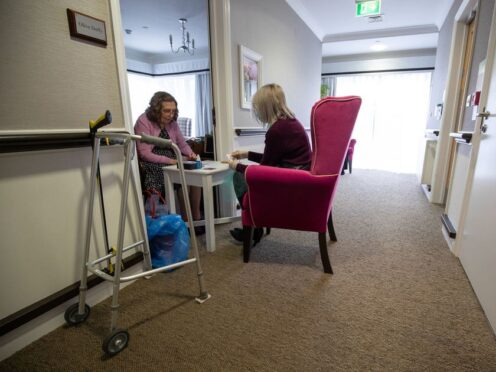
A group set up to campaign for care home residents’ rights during the pandemic has said that not being made a core participant for the part of the UK Covid-19 Inquiry dealing with social care is the “worst slap in the face”.
Care Home Relatives Scotland (CHRS) hit out at the decision of Inquiry chair, Baroness Hallett after she ruled the group, as well as CHRS Lost Loved Ones, “did not play a direct and significant role” in matters that she will consider in Module 6 of the inquiry.
This section of work will investigate the impact the pandemic had on the adult social care sector across all of the UK.
Baroness Hallett initially ruled that CHRS would not be granted core participant status for this section of the inquiry in January, with this decision then reconsidered on two separate occasions.
After she confirmed her “final decision” not to grant core participant status to the group, CHRS said it was “really disappointed”.
In a statement, the organisation branded the decision “disheartening”, as they questioned if the Inquiry’s findings in this area would be relevant in Scotland “as relatives and residents have no voice”.
CHRS said: “Will we be able to accept any of the Inquiry’s conclusions when key witnesses in Scotland are being excluded?
“It feels like the worst slap in the face we’ve had since we started the campaign four years ago this summer.”
We are extremely disappointed to have been rejected for core participant status in the UK covid inquiry. It states that we ‘did not play a direct and significant role’. The full direction can be read here https://t.co/enauqhmzcE @MareeToddMSP @GrahamEllis247 @MonicaLennon7 pic.twitter.com/DP1FnrM9Yp
— Care Home Relatives Scotland (@ChrScotland) March 23, 2024
CHRS added that despite “detailed requests for reconsideration setting out the unique role” it played, the Inquiry chair had “maintained her conclusion” on the issue of core participant status.
The group also insisted it was “simply not true” that other organisations could be better placed to speak for Scottish care home residents and their families in the Inquiry.
CHRS said while they liaised with the organisation Rights for Residents, who have been made core participants, “they can’t tell our story and their experience in terms of involvement and ministerial meetings and working groups was entirely different”.
The group said “fortunately” the separate Scottish inquiry into the Covid pandemic had “recognised our importance”, with CHRS saying they hoped this work would be shared with Baroness Hallett.
They spoke out after the UK Covid-19 Inquiry chair said that, after considering the matter, she remained “of the view that the applicants do not meet the criteria set out in Rule 5 for designation as a core participant in Module 6”.

Baroness Hallett said: “I wish to reiterate my deep sympathy to each and every individual who has experienced the tragic loss of a loved one or been impacted as a consequence of the Covid-19 pandemic.”
But she added: “While I appreciate the important and commendable work the applicants undertook to advocate on behalf of care home residents and their families during the pandemic, and the evidence that they can provide with regard to impact and the lessons that may be learned from its experience, I consider that they do not meet the criteria in Rule 5.
“I acknowledge that the chair of the applicant organisation held meetings with decision makers in relation to visiting guidance in Scotland, which they reviewed and then monitored and therefore played a role in relation to visiting guidance.
“I am not satisfied, however, that it was a role that was direct and significant.”
Baroness Hallett went on to stress that the impact of visiting guidance on care homes was “just one aspect” the Inquiry would look at, adding she was “not satisfied that the applicants played a direct and significant role with regard to any of the other aspects” that will be considered in this section.
She added that she considered other organisations to be “more representative and better placed in any event to advance such interests”.
The Inquiry chair added: “It is not necessary for an individual or organisation to be a core participant in order to provide evidence to the Inquiry.
“The applicants may have relevant information to give in relation to the matters being examined in the Inquiry.”

Enjoy the convenience of having The Sunday Post delivered as a digital ePaper straight to your smartphone, tablet or computer.
Subscribe for only £5.49 a month and enjoy all the benefits of the printed paper as a digital replica.
Subscribe